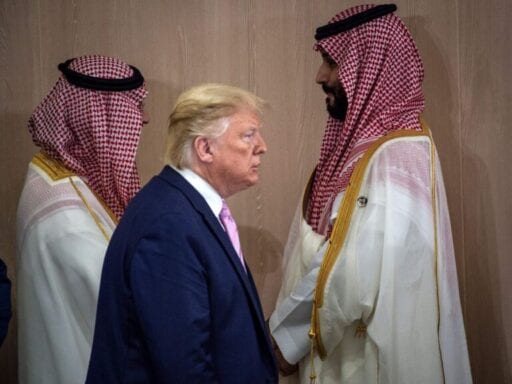A key driver in the conflict with Iran isn’t politically viable.
Everything that happens in the US-Iran relationship is profoundly structured by America’s longtime alliance with Saudi Arabia, a major regional rival of Iran.
That US-Saudi alliance has long been an unquestioned priority of the Washington foreign policy community, though in recent years elite support for Saudi Arabia has come under strain because of the humanitarian disaster in Yemen and the Saudis’ murder of Washington Post columnist Jamal Khashoggi, whose children are American citizens. But even by the standards of American presidents, Donald Trump has clung unusually tightly to the Saudis while sharing nothing with the public about his financial relationship with the Saudi government.
It’s also worth noting that while a strong alliance with Saudi Arabia has long been a mainstream position for American foreign policy elites, it’s very unpopular with the American public.
And that, in turn, helps explain why hawkish discourse on Iran tends to be so dishonest. The case that US hostility to Iran is good for our key regional ally is strong, as is the case that efforts to create a US-Iran rapprochement are bad for Saudi Arabia. But for most Americans, the Saudi alliance is not a good reason for the United States to incur costs fighting Iran because the Saudi alliance itself is not good.
Polls show Americans don’t like Saudi Arabia
Gallup’s most recent poll, from February 2019, showed that just 4 percent of Americans have a “very favorable” view of Saudi Arabia and 25 percent with a “somewhat favorable” view. Those numbers are worse than Venezuela or Cuba.
A YouGov poll taken in the fall of 2018 showed that more Americans see Saudi Arabia as an enemy than as an ally, and only a minority even see the country as friendly to us at all.
/cdn.vox-cdn.com/uploads/chorus_asset/file/19574644/Saudi_Arabia_1.png)
A Business Insider poll conducted in September 2019 asked a more stark ally-or-not question and found that 22 percent of the public considers Saudi Arabia to be an ally.
This is, obviously, not how the American government sees it. And it’s certainly not how the Trump administration, in particular, or Iran hawks in general see it. But in a democracy, it’s hard to tell people you are doing things for the sake of an alliance that the public doesn’t believe in.
So it’s useful to make stuff up instead.
A false portrait of Iran mobilizes the public
While the public is skeptical of Saudi Arabia, that doesn’t mean they’re blasé about Iran.
Back in June 2019, polls showed strong majority support for military action if that was necessary to prevent Iran from obtaining nuclear weapons.
War with Iran shouldn’t be necessary to prevent Iran from obtaining nuclear weapons, because the Obama administration struck a diplomatic deal which prevented that from happening. The deal was, from the standpoint of nuclear weapons experts, a really great deal that did a really good job of addressing the potential of Iranian nuclear weapons capability. That’s something the Obama administration cared a lot about, and it’s something the American public also cared about.
But the deal was not so good at helping the Saudis gain the upper hand vis-a-vis Iran in regional power competition. Since the deal helped the Iranian economy, it was arguably bad for helping the Saudis. And the Saudis certainly saw it that way. This is the main reason the deal was so controversial in American national security circles. And it’s why Trump scuttled the deal, initiating the current downward spiral of relations.
The problem for hawks is you can’t say you’re scuttling a deal that accomplished something voters care about in order to bolster an alliance they don’t care about.
So Trump likes to claim the Iranians were breaking the deal, which if it were true, would be a good reason for the US to pull out of the deal. But it isn’t true. On Friday, Vice President Mike Pence suggested on Twitter that the Iranian Quds Force had something to do with 9/11, which, again, would be a good reason to be hostile to Iran if it were true. But it isn’t true! And Secretary of State Mike Pompeo said that assassinating Qassem Soleimani disrupted imminent threats to Americans and saved lives, which would be a pretty good reason if it were true. But subsequent reporting has made it clear that this isn’t true either.
While the things hawks say about this situation aren’t true, they don’t tell these tall tales because they’re crazy or stupid. They say them because they are aware that the real reason for favoring confrontation with Iran — commitment to the idea that the US-Saudi alliance is valuable and we should be helping the Saudis prevail in their regional power struggle — isn’t politically viable.
Author: Matthew Yglesias
Read More



